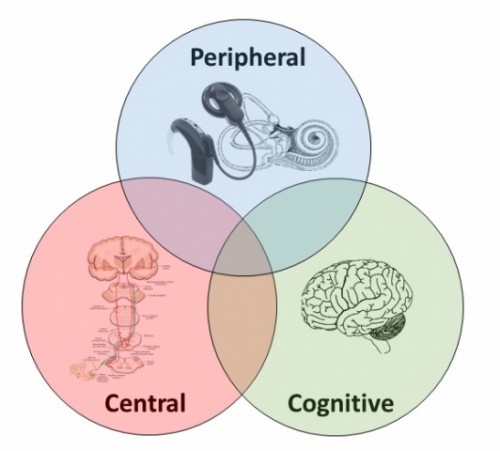This research aims to understand age-related temporal processing in older cochlear-implant (CI) users. The gap in knowledge is that critical measurements and comparisons have been unavailable to disentangle peripheral from central factors that impact CI performance. The long-term goals of this grant are to (1) understand the biological effects of auditory aging and (2) determine how to best remediate age-related auditory deficits with a CI. The overall objective of this application, which is the next step toward attainment of our long-term goals, is to disentangle the peripheral and central contributions to age-related temporal processing deficits in CI users. Our central hypothesis is that age-related speech perception deficits are explained by unique contributions from peripheral and central auditory functions, which significantly affect outcomes in older CI users. The rationale is that CIs are uniquely suited to disentangle peripheral vs central contributions of age-related temporal processing deficits because they can bypass or easily characterize peripheral contributions to hearing, making an ideal system for auditory aging research. We plan to test our central hypothesis by pursuing the following specific aims: (1) Determine the extent to which temporal processing from single-electrode stimulation can be explained by aging and the peripheral electrode-to-neural interface in CI subjects; (2) Determine the extent to which speech perception can be explained by aging and the peripheral electrode-to-neural interface in CI subjects; (3) Determine the extent and manner in which central auditory compensation overcomes peripheral processing deficits that contribute to age-related performance declines in CI subjects. These aims will yield the following expected outcomes. First, we will understand how aging and ENI correlate with each other, and how well peripheral contributions explain simple single-electrode temporal-processing performance. Second, we will understand if peripheral contributions play a smaller role in explaining speech perception performance using multi-electrode stimulation, relative to perception of simple signals presented to single electrodes. Third, we will ascertain if age-related central processing deficits contribute above and beyond the peripheral deficits for processing of both simple and complex acoustic signals (including speech) among CI listeners. The proposed research is significant because expanding our understanding of the locus of the age-related temporal processing deficits will help develop age-specific guidance to CI candidacy, approaches to CI programming, and CI rehabilitation, improving an older CI user’s performance and quality of life. The proposed research is innovative because CIs offer a unique ability to bypass and characterize the periphery, allowing us to disentangle peripheral vs central mechanisms that contribute to age-related hearing deficits.



